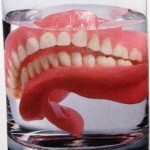Grow your own teeth even after 50 years


So this technology will bring a drastic change in the use of dentures where own teeth will be preferred much more than the artificial teeth.
Paul Sharpe, a specialist in the field of regenerative dentistry at the Dental Institute of King’s College, London, says the new procedure has distinct advantages over false teeth that require a metal post to be driven into the jaw before being capped with a porcelain or plastic tooth.
“The surgery today can be extensive and you need to have good solid bone in the jaw and that is a major problem for some people,” Professor Sharpe said.
The method could be used on far more patients because the ball of cells that grows into a tooth also produces bone that anchors to the jaw.
The choice of growing a new tooth is likely to appeal to patients. “Anyone who haslost teeth will tell you that, given the chance, they would rather have their own teeth than false ones,” said Prof Paul.
Procedure:
Doctors take stem cells from the patient. These are unique in their ability to form any of the tissues that make up the body. By carefully nurturing the stem cells in a laboratory, scientists can nudge the cells down a path that will make them grow into a tooth. After a couple of weeks, the ball of cells, known as a bud, is ready to be implanted. Tests reveal what type of tooth – for example, a molar or an incisor – the bud will form.Using a local anesthetic, the tooth bud is inserted through a small incision into the gum. Within months, the cells will have matured into a fully-formed tooth, fused to the jawbone. As the tooth grows, it releases chemicals that encourage nerves andblood vessels to link up with it.
The most intresting part of this procedure is how the teeth are going be to distinguished from each other, they are saying that the molar and the incissor can be differentiated, How are the differentiated ???? is the big question.
Results:
These tests have been done on mice which have shown positive results, as the teeth have grown in weeks.On this Prof. Paul says “There’s no reason why it shouldn’t work in humans, the principles are the same”

No comments:
Post a Comment